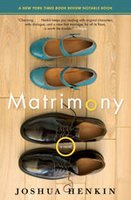
"Did you always want to be a writer?" Author and creative writing professor Joshua Henkin answers this question, a popular one with the reading groups he visits to talk about his novel Matrimony. Check back tomorrow for more of Josh's book club musings and behind-the-scenes stories of the groups he met with in February.
February's Condensed Statistics
Number of Book Groups Visited: 7
Number in Person: 3
Number by Phone: 4
Number of States Represented: 6 (New York, California, New Jersey, Utah, Pennsylvania, Minnesota)
Total Number of Participants, not including author: 74
Total Number of Male Participants, not including author: 2 (Come on, guys, do a better job. What are you doing instead of being in book groups? Playing poker?)
A Popular Question in February: Did You Always Want to be a Writer?
The answer is both yes and no. And I'm lucky that the career span of a writer is so long: I could afford a relatively late start. People like to say that as long as you're under fifty, you're a young writer. (I'm sure that when I hit fifty, I'll be saying that it's as long as you're under sixty....). If I were a basketball player, say (or a ballerina!), I'd be long past retirement. I didn't really start to write fiction until after college. At the same time, I always wanted to be a writer. But I also always wanted to be a basketball player, and at some point you realize that you're neither good enough nor tall enough. That was kind of how I felt about writing. In college, I took a more traditional academic path; I was studying political theory, and since I was the son of a professor, I had this skewed idea about what would be a sensible career. I thought getting a Ph.D. in the humanities was the safe, sober choice! So I was planning to get a Ph.D. in political theory, but before I did that, I decided to move to Berkeley for what I thought would be a year before I went to graduate school.
I had a romantic idea of Berkeley, in part because I grew up in New York City and California felt both far away and mythical, but also because my father taught at Columbia --- we lived in Morningside Heights --- and one of my earliest memories was of the campus protests. I was four years old in 1968, and one day, when my mother took me to nursery school, we were stopped at the entry to College Walk because of the student riots. We had to turn around and go home. It was my version of a snow day! I grew up with an idealized conception of the student protest movement, and the way I looked at things, if Columbia was great, Berekeley was even better.
So there I was, in September of 1987, having moved to Berkeley without having found an apartment --- for the first few weeks I slept on a friend's floor while I looked for rentals. In good Berkeley tradition, I didn't know what I was going to do, but I had to support myself. I ended up working for a magazine, where one of my tasks was to be the first reader of fiction manuscripts: I was to pass on to the fiction editor the submissions that looked most promising. I was struck by how terrible most of the submissions were, and I found this strangely inspiring. It wasn't that I thought I could do better. But I felt that if other people were willing to try and risk failure, then I should be willing to try and risk failure, too. And that's what got me started writing.
I took a couple of workshops in Berkeley, got some encouragement, ended up going to graduate school in fiction writing at the University of Michigan, and the rest, as they say, is history. But to this day, I carry with me that lesson that I learned at the magazine. You have to be willing to risk failure. A writer is always doing that. The page is always blank, and you wonder whether you'll be able to do it again; the fraud police watches over you.
We all know that experience of reading a novel we love and then reading another novel by the same author and we don't love it as much. And then we read a third novel by that author and we love that one. What happened? Did the author get worse and then get better again? Unlikely. It's just that some novels come together and other novels don't, and why that is is a mystery. I'm now at the stage where nothing I write will be so bad that it won't pass freshman English. But will it be magical? Will it jump off the page? There's a lot of luck involved in that, and a lot that's mysterious. Come back tomorrow for more on this.
---Joshua HenkinPrevious RGG.com Posts by Joshua Henkin:
Book Club Adventures, January 2009
Book Club Adventures, January 2009 Part II
Book Club Adventures, December 2008
Book Club Adventures, December 2008 Part II
Book Club Adventures, November 2008
Book Club Adventures, November 2008 Part II
Shouting Matches and More

